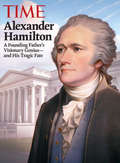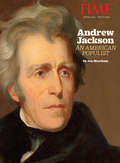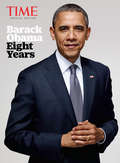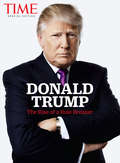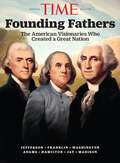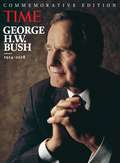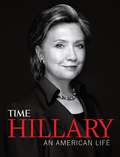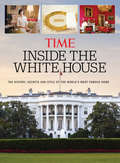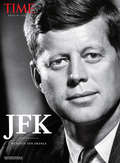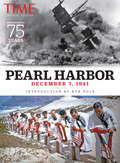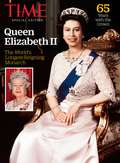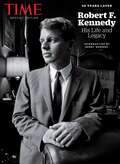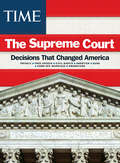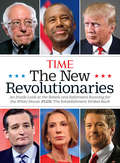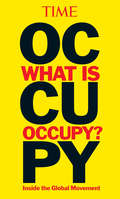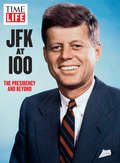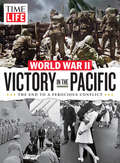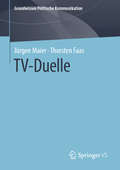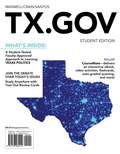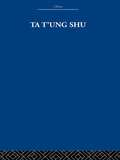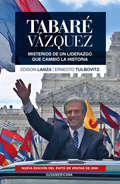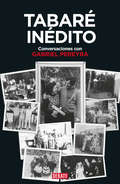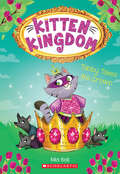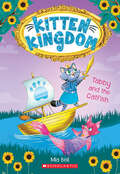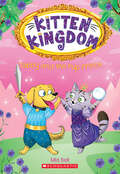- Table View
- List View
TIME Alexander Hamilton: A Founding Father's Visionary Genius and His Tragic Fate
by Editors of TIMELong considered the forgotten founding father and primarily known for the duel with Aaron Burr that ended his life, Alexander Hamilton has recently achieved a new level of fame because of the hit Broadway musical Hamilton, inspired by the New York Times best-selling biography by acclaimed historian Ron Chernow.Now the editors of TIME present this special edition that celebrates Hamilton and his many accomplishments: as one of the primary architects of the Constitution, an aide and counsel to General George Washington, and the first secretary of the Treasury, as well as his intense, long-standing rivalry with Thomas Jefferson and how it affects our government to this day. Also included in this fully illustrated edition are "Six Things You Didn't Know About Alexander Hamilton," an interview with Chernow, the making of the Broadway musical, why Hamilton's days on the $10 bill are numbered, and much more.TIME brings keen insight to the improbable life of the illegitimate son of a Caribbean merchant who would go on to help shape our nation, lay the foundation for the modern economy, and become the inspiration for a musical that is inspiring Americans to interpret history in an entirely new way.
TIME Andrew Jackson: An American Populist
by Jon Meacham The Editors of TIMEAndrew Jackson remains one of America's most extraordinary, influential and at times controversial leaders, defined by a brilliant military and political career that sought to advance the needs of the common man over those of the entrenched elite-in essence, giving rise to the idea of populism. This powerful TIME special edition, Andrew Jackson: An American Populist, examines the seventh president of the United States, his willful and combative style and his enduring legacy, and why it is so resonant today. Born of humble origins and orphaned as a child, Jackson became a lawyer, a brave and heroic general, and a United States senator before winning the presidency by besting John Quincy Adams, who had been born with great privilege. As a two-term president, Jackson distinguished himself with his skill at consensus-building as well as his quest to rout corruption out of the government. He could at times be woefully wrong: brutal in his treatment of American Indians and an unapologetic slave owner until his death. Yet as a gifted and strong-minded political tactician Jackson delivered significant legislative accomplishments, including keeping South Carolina in the union. After his presidency, Jackson retired to his plantation in Tennessee, the Hermitage, where he remained active in politics until he died. Jackson's life, actions and legacy are as important today as they were in his time. Through unmatched writing and storytelling as well as remarkable illustrations, Andrew Jackson: An American Populist delivers the full essence of the man.
TIME Barack Obama: Eight Years
by The Editors of TIMEIn his historic presidency, Barack Obama led the United States through eight tumultuous and remarkably active years. And in this definitive, one-of-kind Special Edition, TIME's experts assess the impact his administration had on the U.S. economy, foreign policy, health care and so much more. <P><P>Along with spectacular and often moving images, TIME's unmatched writers and reporters give this presidency a clear-eyed context through issues of race, inclusion and military approach.
TIME Donald Trump: The Rise of a Rule Breaker
by The Editors of TIMEWhether you love him or hate him, dismiss him or maintain a grudging respect, there's no denying that Donald Trump has up- ended this year's election season.Now, in this new Special Edition from the editors at TIME, you'll be able to go inside Donald Trump's world, from his early days in real estate development to his potentially historic race for the presidency.Donald Trump: The Rise of a Rule Breaker takes a balanced approach to the subject of all things Trump: from his outsider status in this year's presidential race to his complicated family life. You'll visit the Trumps at home, learn about the scandal surrounding Trump University and delve more deeply into "Things Called Trump," including apartment buildings, clothing, and casinos. Additionally, you'll look at Donald Trump's faith and his lighter side--which he does have. Additionally, readers will learn about the disaffected voters who are fueling his bid for the presidency.Donald Trump: The Rise of a Rule Breaker gives context to a compelling, complex and fascinating man.
TIME Founding Fathers
by The Editors of TIMECelebrate the American visionaries who created a great nation in the new special edition, TIME Founding Fathers.
TIME George H.W. Bush
by The Editors of TIMEWith determined grace and a steely dignity, George Herbert Walker Bush spent more than 40 years devoted to public service: First as a naval airman - he would be the last president to serve in World War II - and later as UN Ambassador, chairman of the Republican Party, head of the CIA, vice president under Ronald Reagan, and finally the 41st President of the United States. Bush would serve one term, leaving office in 1993. Yet he would never leave the American political landscape: as the father of the 43rd president, George W. Bush, and through continued commitment to volunteerism and philanthropy, he and his wife of 76 years, Barbara, remained in the public eye. Now, in this commemorative edition from TIME, an unmatched team of journalists and essayists, including Pulitzer Prize winners, and current and former correspondents, examine and honor the life and legacy of George H.W. Bush. He was known for many things, including his expert knowledge of foreign policy, and his "gentle touch" to world affairs during the end of the Cold War; his love of practical jokes as well as his appreciation for the personal, handwritten note, which became one of his hallmarks. Practical and driven to action, Bush's commitment to core values cemented the enduring friendships that he would keep with members of his cabinet as well as with the presidents who followed him. This remarkable keepsake edition traces Bush from his early upbringing to his final years, looking at his strengths and weaknesses as a leader and his dimensions as a person.
TIME Hillary: An American Life
by Editors of Time MagazineHillary Clinton embodies a world of "firsts": The first First Lady to have an active - and controversial role - in her husband's presidency, the first American First Lady to run for political office (and win it), the first female United States Senator from the state of New York, and certainly not last, nor the least, the most widely traveled Secretary of State in history. With reporting that only TIME magazine can bring to you, this book touches upon the high and low points of her life and career - from her time as First Lady, where she was often criticized for her active and assertive role in Bill Clinton's presidency, to her time in the United States Senate, her historic campaign for the nomination for president, and her decision to serve under the man who would defeat her - Barack Obama - as Secretary of State. This book will also help to dissect what the future might hold for Hillary, whether she chooses to run for office again or decides to remain a private citizen and devote her time to lecturing, teaching, and philanthropy.
TIME Inside the White House: The History, Secrets and Style of the World's Most Famous Home
by The Editors of TIME1600 Pennsylvania Avenue is perhaps the world's most famous address, and it is no ordinary home as it is the address of the White House, the official residence of the President of the United States. It is both global command center and family sanctuary, steeped in rich history and the world's most public private home. From the West Wing and the Oval Office, where most of the business of governing the country happens, to the East Wing, which has become the center of power for the First Lady, the White House is a world unto itself, situated on 18 acres, with over 100 rooms, thousands of staffers, its systems and infrastructure, and some of the most complicated and intense security in the entire world.Now, in an all-new Special Edition, TIME Inside the White House: The History, Secrets and Style of the World's Most Famous Home, readers go inside the White House in words and photos and learn of the rich history of America's House. The first presidential couple to inhabit the house in 1800 - John and Abigail Adams - moved into a home with only six inhabitable rooms. But over the years and based on presidential whims and desires, the changing times, and just as America has grown and evolved, so has the White House. Packed with diagrams, photographs and stories that chart the history of this symbolic house, TIME Inside the White House is an exclusive invitation to view this house like never before.
TIME JFK: His Enduring Legacy
by David Von Drehle The Editors of TIMEJohn F. Kennedy spent less than three years in the Oval Office, and it has been more than five decades since his assassination. Yet in public opinion polls, he is consistently rated one of the country's top presidents. <P><P>JFK entered the White House at a time of mounting global and domestic tensions and showed himself to be a decisive leader. He faced down the Russians. He tamed Big Steel. He inspired Americans with his oratory, promoting public service, civil rights and the belief that the United States could send a man to the moon. <P><P>JFK was the man for the moment. He ushered in the American Century and prepared the nation for its new role as a world superpower.
TIME Pearl Harbor: December 7, 1941
by Bob Dole The Editors of TIMETIME Magazine examines Pearl Harbor, 75 years later.
TIME Queen Elizabeth II: The World's Longest-reigning Monarch
by The Editors of TIMEQueen Elizabeth II is the longest-reigning British ruler and the longest-serving living monarch. Celebrate this record-breaking ruler in this commemorative edition from TIME.
TIME Robert F. Kennedy: His Life and Legacy 50 Years Later
by The Editors of TIMEHe was a man of seeming contradictions. Born to great wealth, Bobby Kennedy made common cause with the least fortunate. Initially viewed as ruthless over time he became deeply concerned with the plight of others — and he struggled to find realistic political solutions to their problems. He loved a crusade, and in his early years in public life, he opposed communism, corrupt labor-union leaders and organized crime. Later, he found larger, more complex targets to address: racism, poverty, institutional indifference. Most important, he challenged all of us to join him, not simply in imagining a better world for all, but in doing the difficult, everyday work of making those visions reality. Fifty years after Bobby Kennedy's assassination, celebrate his legacy with this special edition TIME Robert F. Kennedy.
TIME Supreme Court Decisions
by The Editors of TIMETIME Magazine examines important decisions by the Supreme Court.
TIME The New Revolutionaries: An Inside Look at the Rebels and Refomers Running for the White House
by Editors of TIMEThe editors of TIME present a guide to the presidential hopefuls that have surfaced for the 2016 election. These political outsiders are storming the capitol, and challenging the status quo of the Washington insiders. Highlights include:Q&A's with some of the most talked about candidates, including Donald Trump and Ben CarsonFrom Teddy Roosevelt to Ralph Nader, an overview of political outsiders throughout historyThe Establishment Fights Back: How Hillary Clinton, and other Washington veterans aren't handing over the keys just yet.
TIME What is Occupy?: Inside the Global Movement
by Editors of Time MagazineThe grassroots movement that started Sept. 17, 2011, with a protest in a park near Wall Street has mushroomed into a series of demonstrations in hundreds of cities around the world. In a year of protests from the Middle East to Madison, Wis., the Occupy uprising, a passionate outcry for economic justice, has been defined by its lack of definition. Now from TIME comes an illuminating collection of stories that answers many of the key questions about Occupy: How did it get started? What's behind the anger of the so-called 99% this group claims to represent? Who leads this leaderless movement? What should its agenda be? How can it transcend the occupation of tiny Zuccotti Park in lower Manhattan? What Is Occupy? includes chapters from the pages of TIME by columnists Joe Klein and Rana Foroohar, as well as new chapters original to the book, plus the results of exclusive TIME polls.
TIME-LIFE JFK at 100: The Presidency and Beyond
by The Editors of TIME-LIFEWar hero. Political icon. Martyr. As the 35th president of the United States, John F. Kennedy is one of the most celebrated figures in American history. Born into wealth and power, Kennedy proved himself to the nation as a young man, then rose through the ranks of elected office, reaching the White House at just 42 years old. It was the dawn of the nuclear age, and in his short term as president, JFK balanced a Cold War steeliness with a commitment to public service to assert America's role as a global leader. Alongside his wife, Jackie, and their two young children, JFK represented the new face of a new generation, and the hope and optimism he expressed continues to reverberate today.
TIME-LIFE Victory in the Pacific: The End to a Ferocious Conflict
by The Editors of TIME-LIFEAs 1945 progressed, Allied forces continued to move from island to island across the Pacific, closing in on the Japanese homeland. In Victory in the Pacific, youÍll find the winning strategies that lead to the Allies retaking Manila, invading Okinawa, attacking Iwo Jima and, finally, dropping the atomic bomb on Hiroshima and Nagasaki. The Japanese could fight no more. After six long years, World War II was truly over.
TV-Duelle (Grundwissen Politische Kommunikation)
by Thorsten Faas Jürgen MaierTV-Duelle sind ein fester Bestandteil und zugleich das wichtigste Einzelereignis in modernen Wahlkämpfen. Sie werden von Millionen von Zuschauerinnen und Zuschauern gesehen und umfassend in Massenmedien, aber zunehmend auch in den neuen Medien begleitet. Das vorliegende Buch gibt einen Überblick über Geschichte, Nutzung, Inhalte und Wirkungen von TV-Duellen. Im Fokus stehen dabei vor allem TV-Duelle in Deutschland. Der InhaltTV-Duelle in modernen Wahlkämpfen • Debattenforschung, aber wie? • Geschichte, Verbreitung und Varianten von TV-Duellen • Debatteninhalte und Debattenstrategien • Nutzung von TV-Duellen: Umfang, Rezipientenmerkmale und -motive • Wahrnehmung von TV-Duellen und Wahrnehmung des Debattensiegers • Wirkung von TV-Duellen • Kommunikation über TV-Duelle • Was gibt es nach 60 Jahren Debattenforschung noch zu untersuchen?Die AutorenProf. Dr. Jürgen Maier ist Professor für Politische Kommunikation an der Universität Koblenz-Landau. Seine aktuellen Arbeitsschwerpunkte liegen in den Bereichen Politische Kommunikation, Wahlen und politische Einstellungen sowie Einsatz experimenteller Designs bei der Untersuchung sozialwissenschaftlicher Fragestellungen.Prof. Dr. Thorsten Faas leitet die Arbeitsstelle "Politische Soziologie der Bundesrepublik Deutschland" am Otto-Suhr-Institut für Politikwissenschaft an der Freien Universität Berlin. Seine Arbeitsschwerpunkte liegen im Bereich von Wahlen, Wahlkämpfen und Wahlstudien.
TX.GOV
by William Earl Maxwell Ernest Crain Adolfo SantosTX.GOV employs a motivating debate theme and focuses on the current and historical conflicts and controversies that define Texas politics. This will prepare you to speak intelligently about your state, understand today's issues, and join in the discussions around you.
Ta t'ung Shu: The One-World Philosophy of K'ang Yu-wei
by Laurence G. ThompsonFirst published in 1958.This volume translates one of the major works of modern Chinese philosophy and in so doing makes a major contribution to the study of comparative philosophy. The volume contains an extensive introduction structured as follows: 1. Biographical Sketch of K'ang Yu-wei2. Ta T'ung Shu: The Book3. A General Discussion of the One-W
Tabaré Vázquez: Misterios de un liderazgo que cambió la historia
by Edison Lanza Ernesto TulbovitzLa reedición actualizada de un libro fundamental para conocer la historia de uno de los líderes políticos más importantes de las últimas décadas. Tabaré Vázquez es una de las personalidades políticas más relevantes de las últimas décadas en Uruguay. Su estilo de liderazgo ha marcado la evolución de las fuerzas progresistas, y se ha convertido en el referente ineludible para los uruguayos. En este libro, publicado originalmente en 2004, se recorren las características más salientes de su ascenso político y su forma de ejercer el liderazgo: sus orígenes humildes, la acción social que desarrolló en diferentes instituciones, su carrera como oncólogo y su tardío ingreso a la actividad política, que lo vio ascender en forma fulgurante, salteándose muchos de los pasos intermedios que se consideran imprescindibles. El lector se asomará al Vázquez más humano, consciente de sus virtudes y defectos, hábil para las negociaciones, con especial talento para empatizar con el electorado y tajante en sus decisiones. El texto también incluye decenas de testimonios de amigos, familiares y colegas, que construyen una pintura única de las múltiples facetas de su personalidad. Tampoco se rehúyen aspectos polémicos como su pertenencia a la Logia de la Masonería, su posición frente al aborto o las acusaciones en las que se vio envuelto a lo largo de su carrera. Este es un libro esencial para comprender la complejidad de una de las personalidades políticas más importantes de la izquierda uruguaya, cuyo legado se proyecta al futuro.
Tabaré inédito: Conversaciones con Gabriel Pereyra
by Gabriel PereyraTras su temprana muerte, yo había descartado publicar nuestras charlas. Pero en varias ocasiones, con una media sonrisa, Vázquez me había preguntado: «¿Y, va a hacer algo con aquellas charlas?»; o «¿Le parece que sirven para publicar algo?». Entonces le di una respuesta ambigua. Gabriel Pereyra Pare, pare, usted se está comportando como un periodista, no como un escritor. Parece que esto que le digo lo quiere sacar mañana, me dijo Tabaré Vázquez en una de las tantas conversaciones, hasta ahora inéditas, que mantuvimos a mediados de 2011 con el objetivo de hacer un libro. ¿Cómo no comportarme como periodista si se trataba de afirmaciones que habrían sido una bomba de haberlas publicado al día siguiente? Entre otras ideas personales, Vázquez estaba convencido de que la entonces racha triunfadora del Frente Amplio se terminaría si de una vez por todas no se presentaba como una fuerza de centro. Estas y otras afirmaciones quedaron, tras su decisión de lanzarse a conquistar un segundo mandato, a la espera de otros tiempos. Luego de que dejara la presidencia, me preguntó en un par de ocasiones qué haría con este material, como guardando la esperanza de que viera la luz. Vázquez ya no está entre nosotros y, como un homenaje a nuestra relación fraterna y al pensamiento expresado libremente por un hombre que marcó a fuego la historia del país, es que me decidí a publicar esas charlas sobre diversos temas de actualidad. En el libro aparece la voz de su hermano Jorge, contando anécdotas del Tabaré de entre casa y también otras que yo mismo fui atesorando durante el vínculo desarrollado con el expresidente. También aparece una serie de fotos aportadas por su familia. Espero que se adviertan, sin la presión del tiempo, los pensamientos de un hombre que, en el acierto o en el error fue fiel a sus convicciones, aunque estas chocaran incluso con la cultura de la izquierda.
Tabby Takes the Crown (Kitten Kingdom #4)
by Mia BellFor fans of Puppy Princess, this new chapter book series brings together two consistent favorites, cats and royalty, in a fun action-packed adventure!The Founding Day Festival has arrived, and Princess Tabby can't wait! But when King Gorgonzola threatens to ruin it, Tabby must act fast to save the festival.Will the Whiskered Wonders be able to save Mewtopia, or will Tabby's plan be less than purr-fect?
Tabby and the Catfish (Kitten Kingdom #3)
by Mia BellFor fans of Puppy Princess, this new chapter book series brings together two consistent favorites, cats and royalty, in a fun action-packed adventure!Princess Tabby is no scaredy-cat! The day of the Peace Parade has finally arrived, and Princess Tabby can't wait to ride on the Royal Boat! But when King Gorgonzola steals the Torch of Peace, Tabby and her brothers must go underwater to find it. While in the lake, the Whiskered Wonders find the Torch -- and catfish! The creatures just might be able to help. Will Tabby and her new friends be able to bring peace back to Mewtopia?
Tabby and the Pup Prince (Kitten Kingdom #2)
by Mia BellFor fans of Puppy Princess, this new chapter book series brings together two consistent favorites, cats and royalty, in a fun action-packed adventure!Princess Tabby is no scaredy-cat!Princess Tabby must be on her best behavior for the upcoming visit with the royal hounds of Barkshire. She can't wait to play with Prince Buddy, the pup prince. But then King Gorgonzola steals a magic orb, threatening to ruin the visit. Tabby and her brothers must once again stop the evil rat and save the day.Cats and dogs are very different, and tagging along with the Whiskered Wonders is difficult for Buddy. Will he be able to keep up with the royal kittens, or is Mewtopia in for a ruff time?
